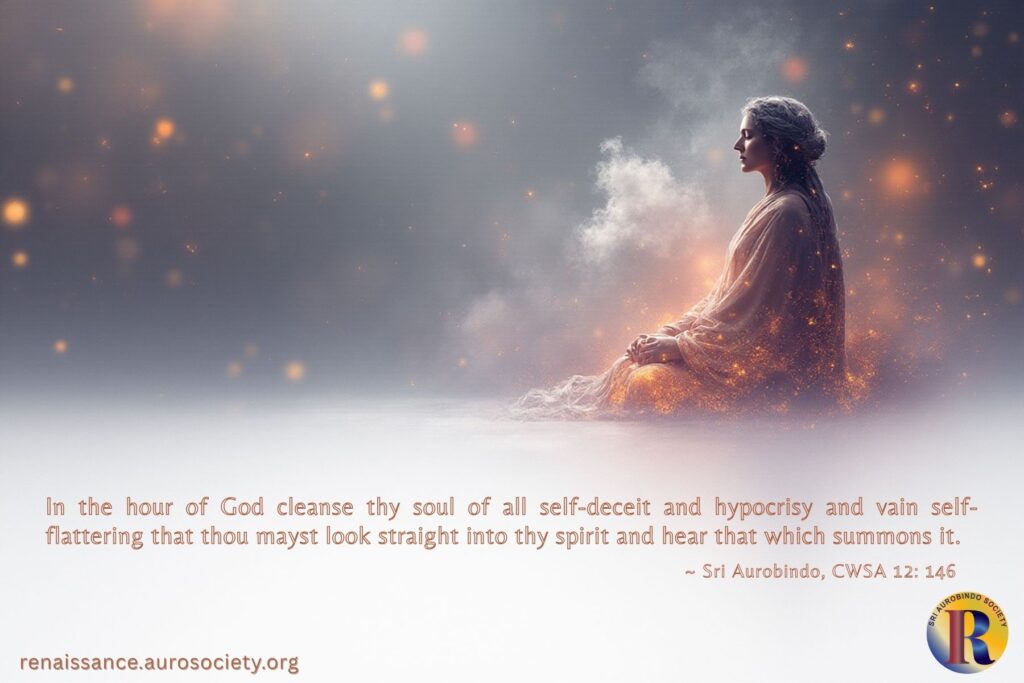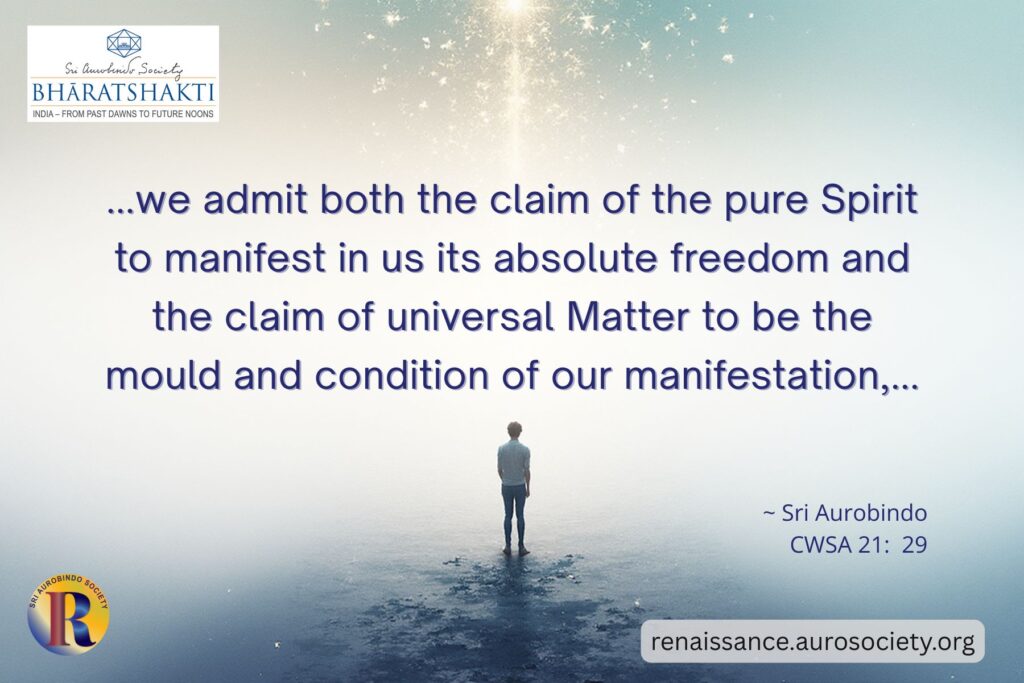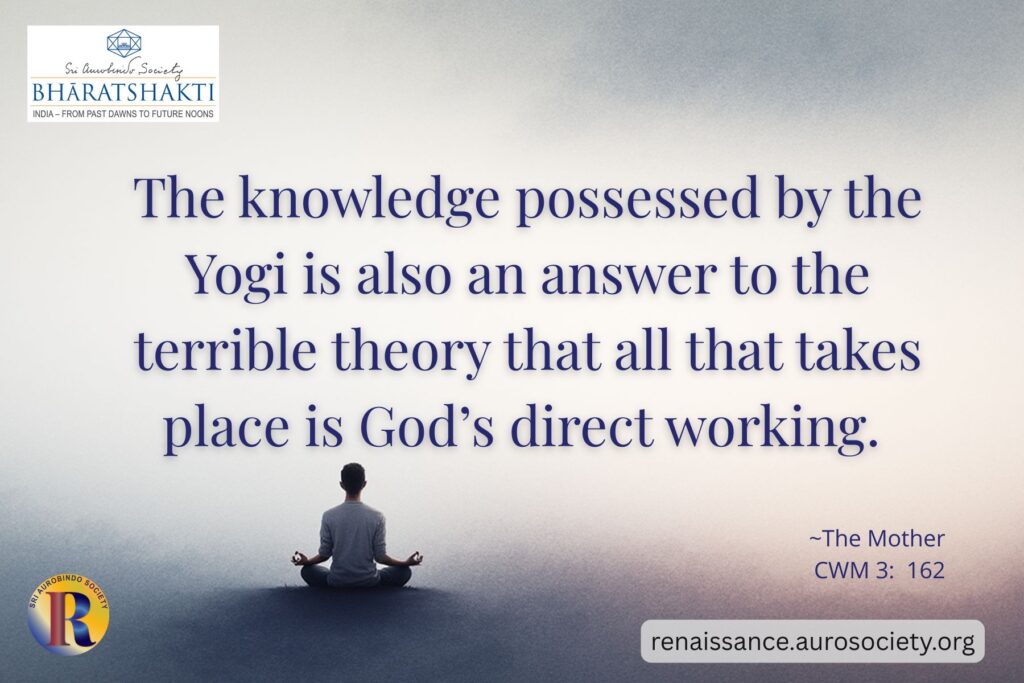Editor’s note: In this two-part article, author Narendra Murty speaks of the higher ranges of consciousness beyond the intellect — inspiration, intuition and revelation — from where a Rishi receives knowledge. A Rishi is someone who sees and hears the Truth which he then expresses as Mantra. Using several insightful passages from Sri Aurobindo’s writings, particularly The Future Poetry, the author brings out Sri Aurobindo’s rishihood.

Modern man is enamoured of his intellect and rationality. But the way of the intellect whose most powerful expression we find in science has not been able to redeem mankind. Yes, it has heaped upon man the gifts of technology, thereby increasing his convenience and comfort, but it has failed to bring into his life the blessings of peace and beatitude. Man continues to stay famished in his soul and remains forever dissatisfied while surrounded by every possible luxury of the world. There’s a longing inside him that never gets satiated; and his rationality doesn’t seem to help. That is why Sri Aurobindo had declared:
An inconclusive play is Reason’s toil.
~ Savitri, Book II, Canto X, CWSA, Vol. 33, p. 252
Reason’s toil, all its achievements, ultimately amount to nothing, because man remains dissatisfied in the final analysis. So, Reason is not the answer. Because “it is a continual ringing of changes in the spinnings of the intellectual circle which leads nowhere or else a collapse to the lower levels which may bring human civilization down with a run to a new corrupted and intellectualized barbarism.” (Sri Aurobindo, CWSA, Vol. 26, p. 269). A mere materialistic or the scientific view of life is a dead end.
Redemption is possible only by a wisdom higher than man’s intellect.
Throughout human history the Rishis and other enlightened sages and mystics have maintained that there are levels of consciousness which are higher than the rational mind. Their ultimate source lies in the realm of the Spirit. All the enduring wisdom of man which has come down to us from the kingdom of Eternity, which has stood the test of the centuries and whose relevance has not faded even one bit through the ravages of time – comes from a level higher than the rational mind.
How do we gain access to those levels of consciousness? How to recognize them? What is meant by a consciousness that is higher than the rational mind? Who are the ones who have gained access to those levels of consciousness? How is that higher wisdom expressed if it lies above the domain of the rational intellect? What kind of language would express such states? These are some of the questions that should concern us.
Who can guide us on this difficult and impenetrable terrain? The answer comes clear from the culture and tradition of this puṇyabhūmi Bhārat: only a person who has himself experienced such states of consciousness, who has seen or heard of something of those supernal planes: a Rishi.
Also read:
Sri Aurobindo’s words on
The Rishis as Makers of Indian Civilization
Work of a Rishi
The Rishis are the ones who have gained access to those higher levels of consciousness and brought down for us some of the diamonds and jewels from that inestimable, invaluable, divine treasury. The Rishi builds for us a bridge that touches the transcendental dimension.
It is obvious that the modes of knowledge prevailing in that high, rarefied air are very different from the coarse grains of the rational intellect; something other than logic, analysis, deduction and inference – our usual modes of comprehending the world. The modes of knowledge that have access to those heights are: Inspiration, Intuition and Revelation. Sri Aurobindo says, “they are rays from a greater and intenser Light than the tempered clarity of our intellectual understanding.” (CWSA, Vol. 26, p. 101).
We frequently use these words – Inspiration, Intuition and Revelation, but we hardly have a real grasp as to their true nature and meaning.
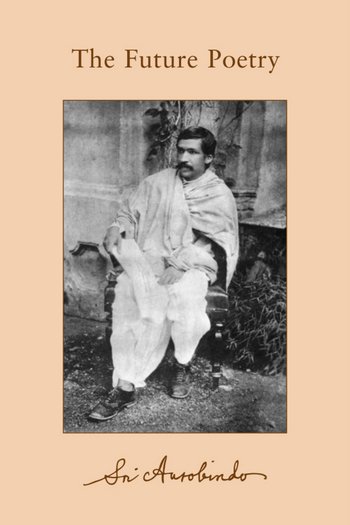
In The Future Poetry, Sri Aurobindo defines Inspiration as something that “comes to us from a superconscient source above ordinary mentality, so that what is written seems not to be the fabrication of the brain-mind, but something more sovereign breathed or poured in from above” (CWSA, Vol. 26, p. 183). Thus Inspiration is a gift that descends from the higher planes and the expression, whether of the poet or a lyricist or a playwright, it does not wear the look of something that is the product of the rational, logical mind.
Inspiration, however, is a force that descends from above and raises the efforts of man from merely the mental or the rational. An inspired work of a poet strikes a chord in the hearts of the readers and they feel uplifted when they come across that higher dimension in the poetic work. It is inspiration that gave a timeless, enduring quality to Tagore’s Gitanjali or Dante’s Divine Comedy or even the plays of Shakespeare. A light from the higher planes had touched such art.
However, Inspiration still belongs to the realm of thoughts, though they may be thoughts from the higher planes.
But Intuition is not about thoughts. It is a kind of vision, a vision that belongs to a higher dimension.
In The Synthesis of Yoga, Sri Aurobindo writes that Intuition with “…..its swift revelatory vision, its luminous insight and discrimination can do the work of the reason with a higher power, a swifter action, a greater and spontaneous certitude. It acts in a self-light of the truth which does not depend upon the torch-flares of the sense-mind and its limited uncertain percepts; it proceeds not by intelligent but by visional concepts: it is a kind of truth-vision, truth-hearing, truth-memory, direct truth-discernment.” (CWSA, Vol. 23, p. 477)
Intuition, though a manner of truth seeing or hearing, is not a complete possession.
It is not a continuous presence in the light of Truth. Intuition occurs in flashes and is discontinuous in its nature. And that takes us to the next level – to that of Revelation which is of “the nature of direct sight, pratyakṣa-dṛṣṭi, . . . It brings out the very spirit and being and reality of the truth and makes it part of the consciousness and the experience.” (Sri Aurobindo, CWSA, Vol. 23, p. 815).
Revelation, thus is a complete possession of that which is revealed, not in flashes, but in a continuous vision of clarity.
In a supremely revelatory passage in The Future Poetry, Sri Aurobindo writes:
The one thing needful is that he [the seer-poet] should be able to go beyond the word or image he uses or the form of the thing he sees, not be limited by them, but get into the light of that which they have the power to reveal and flood them with it until they overflow with its suggestions or seem even to lose themselves and disappear into the revelation and the apocalypse. At the highest he himself disappears into sight; the personality of the seer is lost in the eternity of the vision, and the Spirit of all seems alone to be there speaking out sovereignly its own secrets.
~ CWSA, Vol. 26, p. 38
That is what a Revelation is.
Now a Rishi is a person who has access to these higher modes of knowledge.
He sees beyond the sight of the surface mind and finds the revealing word, not merely the adequate and effective, but the illumined and illuminating, the inspired and inevitable word, which compels us to see also.
~ CWSA, Vol. 26, pp. 26-27
And what the Rishis see, hear or experience, they express in luminous speech which is known to us as Mantras.
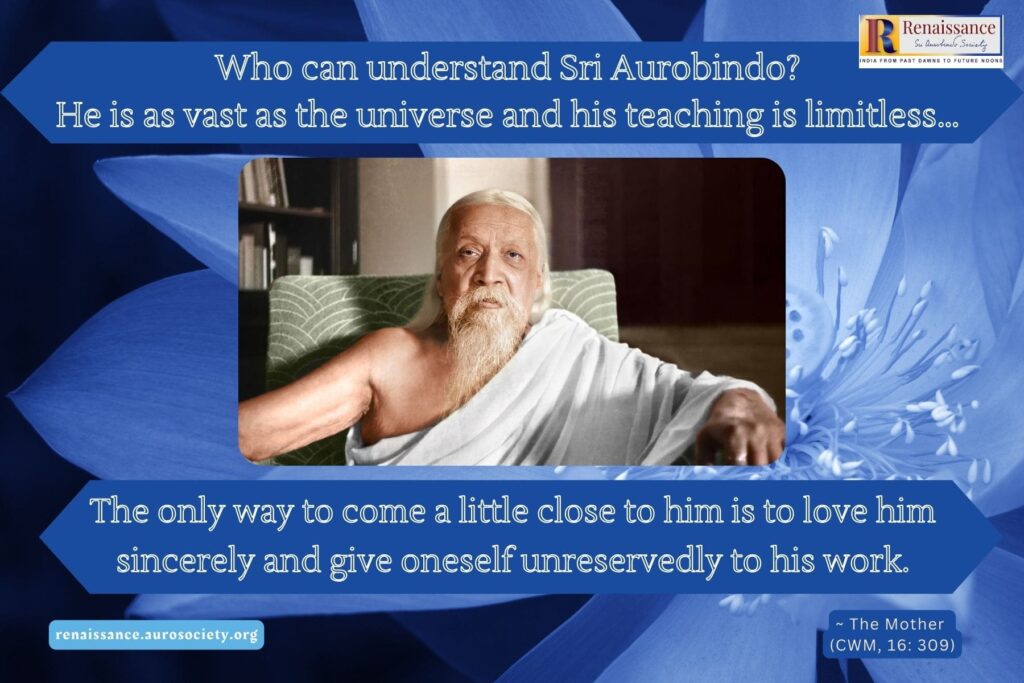
It is not an ordinary manner of seeing or hearing but a divine seeing – Drishti and a divine hearing – Shruti. That is how our scriptures got the name of Shruti – they were revealed Truths that were heard.
The divinely inspired words in which those higher states of consciousness are expressed are called Mantras. Sri Aurobindo in his work The Future Poetry, explains that a mantra is “not in its substance or its form a poetic enunciation of philosophic verities, but a rhythmic revelation or intuition arising out of the soul’s sight of God and Nature and itself and of the world and of the inner truth—occult to the outward eye—of all that peoples it, the secrets of their life and being.” (CWSA, Vol. 26, p. 36)
He further expands:
What the Vedic poets meant by the Mantra was an inspired and revealed seeing and visioned thinking, attended by a realisation……It was a thinking that came on the wings of a great soul rhythm, chandas.
~ CWSA, Vol. 26, p. 217
The Mantra… is a direct and most heightened, an intensest and most divinely burdened rhythmic word which embodies an intuitive and revelatory inspiration and ensouls the mind with the sight and the presence of the very self, the inmost reality of things and with its truth and with the divine soul-forms of it…
~ CWSA, Vol. 26, p. 218
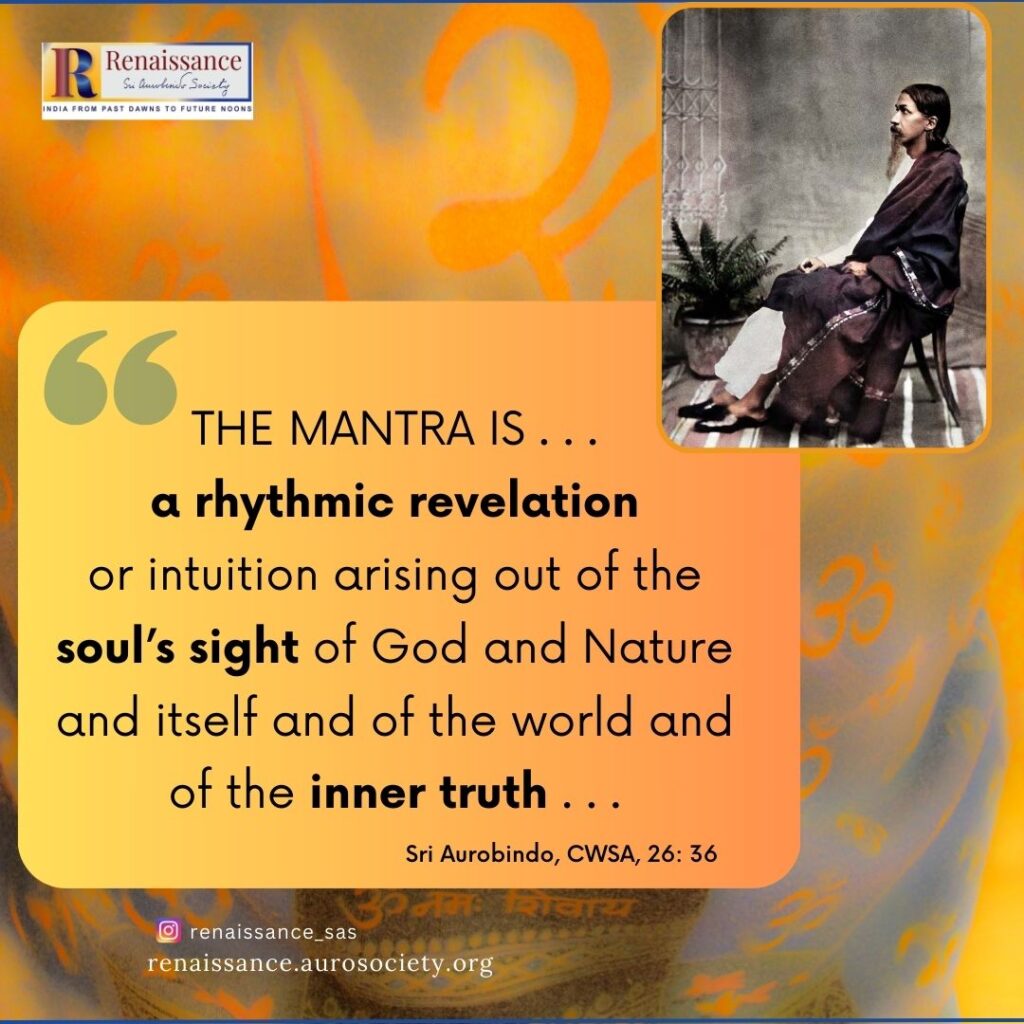
Continued in PART 2
~ Design: Beloo Mehra

